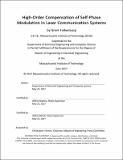High-order compensation of self-phase modulation in laser communication systems
Author(s)
Falkenburg, Grant (Grant E.)
DownloadFull printable version (3.549Mb)
Other Contributors
Massachusetts Institute of Technology. Department of Electrical Engineering and Computer Science.
Advisor
Jeffrey H. Shapiro and Jeffrey R. Minch.
Terms of use
Metadata
Show full item recordAbstract
Self-phase modulation (SPM) creates a power and fiber-length dependent spectral broadening that reduces signal-to-noise ratio in free-space laser communication systems which use a fiber to connect their transmitter's high-power optical amplifier to its telescope optics. The effects of SPM can be mitigated by using a phase modulator to down-chirp pulses before passing through the receiver's matched filter. This thesis tests and evaluates a new SPM compensation technique-applying a phase modulation determined from a measurement of the SPM-distorted waveform's optical intensity-and benchmarks it against sinusoidal phase modulation compensation. The spectra and throughput of the compensated signal are calculated and measured to determine the effectiveness of the new technique. It is found that the two techniques perform within 0.2 dB of each other for fiber lengths less than three times the nonlinear length, and it is expected that the new technique will outperform sinusoidal phase modulation for greater fiber lengths.
Description
Thesis: M. Eng., Massachusetts Institute of Technology, Department of Electrical Engineering and Computer Science, 2017. This electronic version was submitted by the student author. The certified thesis is available in the Institute Archives and Special Collections. Cataloged from student-submitted PDF version of thesis. Includes bibliographical references (page 72).
Date issued
2017Department
Massachusetts Institute of Technology. Department of Electrical Engineering and Computer SciencePublisher
Massachusetts Institute of Technology
Keywords
Electrical Engineering and Computer Science.